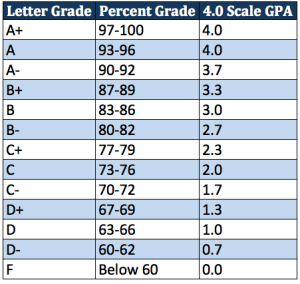 This is a new wrinkle to the series How To Study In College, where I share strategies to get better grades, study less, and produce more free time. I’m trying something different and I hope you enjoy it. What’s that saying, “evolve or die?”
This is a new wrinkle to the series How To Study In College, where I share strategies to get better grades, study less, and produce more free time. I’m trying something different and I hope you enjoy it. What’s that saying, “evolve or die?”
So, beyond the general strategies for preparing for an exam and writing a paper, I thought it would be extremely valuable to ask elite students from different majors, how they succeed and what advice they would give to younger students.
I try to give you guys the best content possible to dominate college. But, I don’t have personal experience in more than one major and my research can only go so deep. So, I’m going to interview the top students in different programs and share their secrets with you.
For those of you not in the major highlighted in this post, I’m confident that you can learn universal strategies to help you be more efficient and improve your mental processing. For those of you in the major highlighted (or similar), it’s your lucky day.
Quick Interview Bio
Garrett Morton: A senior Mechanical Engineering major, who accepted a job offer at Gentex.
Brian: What makes engineering classes unique? And how do you adapt?
Garrett: Well, teachers don’t expect you to memorize in engineering. In general ed classes you can memorize lists of vocabulary words or dates, and do well. But, engineering isn’t at all like that. Everything is a problem and you’re always solving problems.
This may be obvious, but one of the best ways to succeed is to go to class and pay attention in class because the professors are going to go through all the hard problems, which is especially important in engineering. These problems are going to show up again in the homework and exam questions.
Chances are in the real world that we won’t have to solve almost all the problems we do, but the whole point is to learn how to solve problems so we can in the future.
Brian: What strategies have you used for homework problems?
Garrett: On graded homework, I really make an effort to do the problems as early as possible. I break the assignment into chunks and try to do a couple problems a night—problems usually take around one hour each. This way, if I do have questions, then I can quickly ask the professor in class or at office hours. If I wait until the last-minute to do the homework, then I’m in trouble.
I use every resource available for homework. I use my textbook, notes and the Powerpoint from class, and all the formulas provided. One secret is that online solution manuals are available for almost every class. That’s one of the best learning tools and teachers recommend these too.
I do my homework with the solution manual open in a browser window, I don’t look, and then I do a problem until I get stuck. I check if I was right up to that point, and then I see how much I know and what I need to learn more about.
Then, I continue to repeat this process of going through each step in the problem and trying to learn as I go. I feel this helps me process the information better.
I also reach out to my friends and they reach out to me so we can meet to discuss a homework problem. Odds are that we can collectively figure out a problem. And as I said before, I go to the professor if I’m really stuck.
Brian: What is the best way to prepare for an engineering exam?
Garrett: Because the engineering professors give you the formulas and the option of bringing an equation sheet to the exam, it’s not worth it to spend time memorizing.
So, I look through each problem that the material of the exam covers, and I find and write down any equation that is used in solving. I don’t do these problems, but I use my notes, book, and homework to find equations and their purpose.
Then I make an organized equation sheet. I spend around 80% of my time studying the ins and outs of it. I internalize what the equation does, what kinds of problems need this equation, and what each variable is used for in a problem. I mentally process these aspects of solving instead of wasting time to crunch numbers.
Some classmates I know spend hours doing long problem after long problem, then struggle when the exam has different problems with different variables. That’s why focusing on knowing the equation sheet is the best way to prepare.
Brian: What’s your general advice to engineer majors?
My general advice for all engineer majors is to make really good friends in your program.
Because engineering classes require many group projects and a senior design project, you want people who are responsible, are intelligent, and you can trust. Plus, sometimes the professor lets you pick your group, and that’s a way better time if you’ve built a relationship with people.
It was mentioned before, but it even pays off to have good friends in your major when you’re doing homework. Problems are so big that it’s easy to miss one little part, but so many times my friend or I didn’t miss it, and we could help the other person.
Brian: Why did you decide on Gentex?
(An engineering company that focuses on automotive, aerospace, and fire protection.)
Garrett: I’m really excited about Gentex because they let you go in and work as you learn what you want to do, and then you can find a focus in the company. There are many possibilities from technical engineer work to management.
I haven’t had many real world experiences, so I am intrigued by both the technical and management side. I really like what the company does.
Brian: Describe the advantages of getting your master’s in engineering?
Garrett: If you get your master’s in engineering then obviously you would have more technical background to take with you for work. This could help you in many areas and make the one year investment worth it.
It’s perfect for some people who are really into research and want to dig deep into specific subjects. If you want to teach then you need to go that route. Also, I assume in most cases that you would have a higher salary after getting your graduate degree.
Brian: What advice would you give to engineer majors who are searching for an internship or job?
Garrett: I would take full advantage of career fair because that’s an awesome way to get interviews at good companies. Also, companies usually do info nights on campus and I really recommend going to those and being prepared.
There’s usually a smaller group of people there, so you can talk to employees and put yourself in a good position even before the interview. I’ve heard some applicants who made such a good impression during the info night that the later interview was an easy conversation and then quickly turned into a job offer.
And, I would go to professors for internship and job guidance. Professors are very useful because a lot of engineering professors have worked for engineering companies before teaching, so using them is a huge resource. Almost all of them want to help you and they’ve done it so they know how to help. You can even use them to help point you in the right direction when wanting to know more about a company or deciding on offers.
I definitely wouldn’t start looking online. There’s so much out there that it’s hard to find quality.


